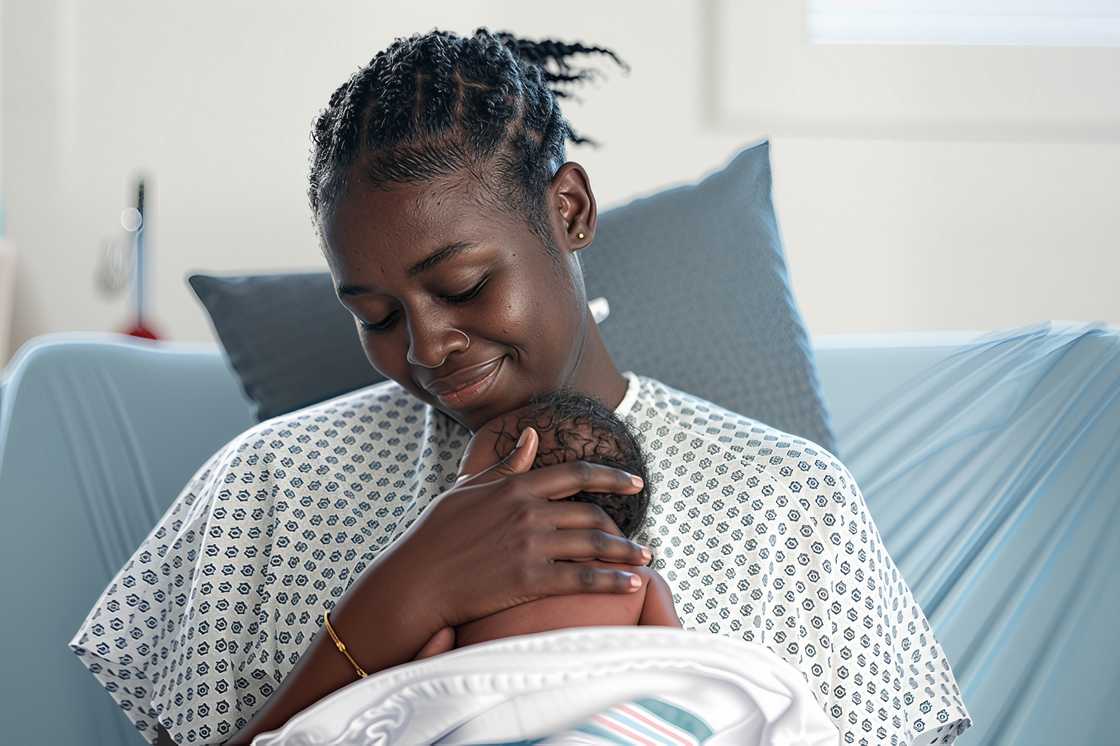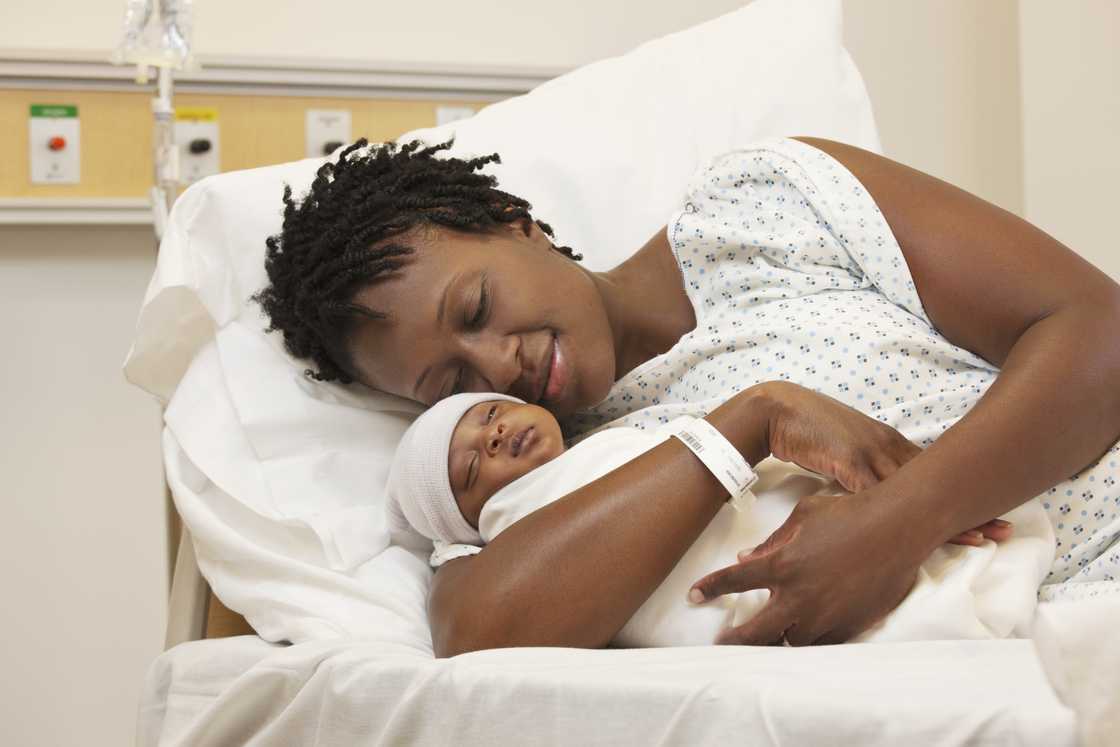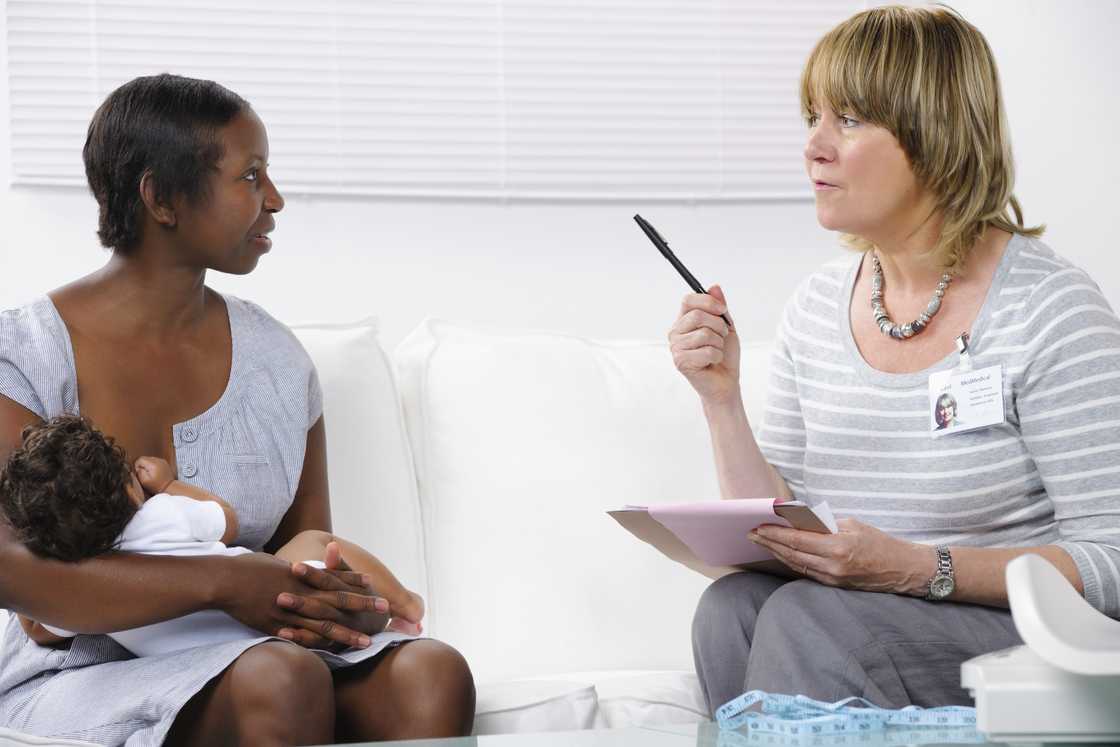Admission Screen Says “Positive”; Second Test Returns “Negative” and Baby Latches
I won’t ever forget the coldness of that screen. One minute, I was clasping my newborn daughter to my chest, under the soft hospital lights of the maternity ward in Cape Town, South Africa. The next minute, the word “positive” stared back at me from the hospital’s admission screen. I recognised the word, though I didn’t want to.

Source: UGC
My heart froze. My husband’s hand squeezed mine. I tried to breathe. Our baby had been born only minutes earlier, and I had just held her and felt her miraculous weight in my arms. The midwife gently nudged me: “You can’t nurse her yet.” The words cracked the silence. “How? Why?” I asked, even though I knew what they meant.
My mind raced: had I somehow brought danger into the world? The screen’s verdict felt like a sentence. A nurse appeared and said, “Policy. Admission test positive. No nursing until confirmatory test returns.”
My mind fragmented. Our baby girl, wrapped in a crisp hospital blanket, sniffled softly. She wanted to latch. I tried to feed her. But they wouldn’t let me. In that moment, I felt powerless. My husband hovered, confused, angry. The nurse looked unmoved. “We must protect the baby,” she said, “until the laboratory confirms.”

Source: Getty Images
PAY ATTENTION: stay informed and follow us on Google News!
So I sat there, skin to skin, but no feeding. I rocked her gently. The policy was there like a blaring warning sign. My mind pushed back: I’m her mother. She’s just been born. She needs me, and I need her.
Yet I was told: wait. I could feel time slowing in the silence, minutes stretching like hours, the hospital’s white walls closing in. The screen still glowed. “Positive.”
My thoughts alighted on everything I'd done: the antenatal visits, the inhaler for my asthma, the days waiting for labour to begin at 41 weeks, the colours of the hospital corridor, my husband’s hopeful face. And now this. My baby, my love, separated from the simplest act of nourishment.

Source: Getty Images
I glanced at my husband, tears brimming. He shook his head. “This can’t be right,” he whispered. The nurse replied, “We follow policy. Until the lab comes back, nothing.”
And so I sat, cradling my daughter but unable to feed, unable to do what felt instinctive and proper. It was the most extended two hours of my life. Every time she directed her tiny mouth toward my chest, I hesitated. The nurse hovered.
My heart clenched. The “positive” verdict echoed in the sterile air. I felt a wave of anger, injustice, and fear: what if this was wrong? What if the screen mis-spoke? What if I were punished because of a false reading? My husband’s jaw set. He muttered, “We’re not accepting this without proof.”

Source: Getty Images
But the nurse was firm: “Policy is policy.” Years of antenatal checks, well-managed asthma, and a healthy full-term baby. None of it mattered now. I felt a chill when the hospital’s social services office was paged in. It sounded official, final.
I didn't know what they would do. Remove the baby? Force formula? I could barely breathe. My daughter whimpered in my arms. I whispered to her, “Mama is here. Mama will fight for you.”
My husband, Sipho, held my arm steady and strong. Together, we waited. We had known for years that we wanted to become parents. Throughout the pregnancy, I managed my mild asthma well with a salbutamol inhaler.

Source: Getty Images
We went for regular antenatal care at our hospital in Cape Town. Weeks of pre-labour discomfort, dreams about holding our baby, the nursery we painted soft yellow, the baby clothes laid out.
At 41 weeks exactly, I was admitted for induction. Everything looked normal and acceptable. My blood pressure is stable, the baby's heart rate is steady, and the scan showed a healthy baby. I have been careful.
I didn't drink alcohol, I stopped smoking years ago, I took iron and folic acid, and I ate well, including mielie pap and fresh vegetables. The ward staff always said I was doing well. The day came. Labour started slowly. With each contraction, I squeezed Sipho's hand and repeated to myself, “Soon you will be here, little one.” I was ready, firm, and excited.

Source: Getty Images
The obstetrician told us all was well and she would be out with one more push. Nine hours later, she came: a beautiful baby girl, pink and squalling, and a wave of overwhelming joy erupted in both of us.
They placed her skin-to-skin. I felt the weight of her head on my chest, her tiny fingers curling around mine. Tears fell. This was it. Our daughter had arrived. But beneath my joy was a living awareness: South Africa's hospital policies are strict, and the hospital's guidelines for newborn safety are rigorous.
I prided myself on everything having gone smoothly until that point. Our baby was full-term and healthy, and my asthma had not complicated things. And yet, in that moment, that screen turned up positive.

Source: Getty Images
I did not know what it meant, but I sensed the winds changing. The stakes were my baby's feeding, our bond, and maybe our rights. On one side, I was a mother drenched in love. On the other hand, a screen, a verdict, a policy. Everything felt unbalanced.
In a crisp uniform and clipped tone, the nurse declared: “The admission screen on the panel reports the baby is positive.”
My breath caught. “Positive for what exactly?” I asked, voice trembling. She said: “It shows positive on the initial immunoassay. The hospital’s protocol says no nursing until we get the confirmatory results.”

Source: Getty Images
My husband and I exchanged puzzled looks. We had no warning, and we weren't told about any risk. I said, “My baby is fine. She’s only minutes old.” The nurse nodded. “I understand,” she said, but added, “Policy controls this. Social services will come to assess feeding options until the lab confirms.”
The pages were pressed. In the next hour, a social worker arrived. A woman with a gentle face but firm voice. She asked us a series of questions: had I taken any illicit substances? Any prescriptions besides the inhaler? Was there drug use in the family? My heart pounded.
I shook my head. I handed over our antenatal records. The officer scrutinised them. She asked about the baby’s Apgar score, birth weight, and any known conditions. None. Everything was normal. Then she turned to the nurse and asked, “What is the nature of this positive screen?” There was silence.

Source: Getty Images
The nurse said, “It’s the immunoassay result. We must wait for GC-MS or equivalent.” The social worker looked at me and said, “Until confirmatory results, the baby cannot latch.” I felt tears burn in my eyes. Dialogue flickered between us: “This is our child,” Sipho said quietly. “We want to nurse.”
“I’m sorry,” replied the social worker. “That’s hospital policy.” I took a deep breath. “But you have a healthy baby—why risk delaying feeding?” The nurse responded: “It’s the lab. We follow the steps. Believe me, we act for safety.”
My heart sank. The midwife came back and sat on the edge of the bed. She whispered, “I’m sorry. These cases rarely happen, but we must act when the screen shows positive.”

Source: Getty Images
I felt anger grow, not just at the policy but at the unknown. Could this test be wrong? Did we deserve this? In that moment, the baby whimpered. She lifted her tiny fist, then closed her eyes. I wanted to feed her. She wanted me. However, policy and test results have formed an invisible wall.
The hours dragged. My husband paced the corridor outside while I stayed in the ward, holding our daughter but starved of that first feeding. I tried to soothe her, telling her my voice, my heart beating. She pressed her cheek to mine.
My inhaler was on the bedside table; I had taken no other prescription. The social worker returned with forms to fill out questions about birth order, family history, and substance use. Each tick felt like an accusation.

Source: Getty Images
The nurse returned: “The lab has received the sample, but the confirmatory test may take several hours. We must pause feeding.” My tears resisted. I whispered over my baby’s hair, “Hold on, little one, hold on.”
Escalation followed. The consultant obstetrician came in, a tall woman with gentle eyes and a firm stance. She asked, “Which assay returned positive? What substance was detected?” The nurse told her, “Initial immunoassay reported positive; cannot disclose specifics yet.”
The consultant frowned. She said, “There is no mention of illicit substances in the history. The inhaler use is documented. Let’s review everything.” She paused. “I think we need a GC-MS confirmatory test. Until then, the baby remains greatly separated from nursing.”

Source: Getty Images
My husband stepped forward. “I’d like that test. I don’t accept this on a mere screen.” The doctor nodded. After she left, the social worker said, “You are free to express milk, but no direct feeding.”
I looked at my daughter. Bottles were already laid out, and pumped milk was planned. We were feeding, but we were not feeding inwardly, as I had imagined. Time circulated slowly. I thought of all the mothers I knew, the stories of first latches in South Africa, husbands cheering, mothers crying tears of joy.
All that got paused now. In the corridor, I overheard a nurse say to a colleague: “False positives can happen with salbutamol inhalers; we’ve seen it.” My body buckled inside at the thought. Had this been an oversight? A screen without context?

Source: Getty Images
My husband returned. “We’ll ask for the results; keep pushing.” The nurse looked away. Hours later, when the confirmatory test results finally arrived, the screen changed colour, and the nurses gathered.
The consultant addressed us: “The GC-MS confirmatory test is negative. No illicit substances were found. The initial screen gave a false positive.”
My mouth dropped open. Relief flooded through me. My husband exhaled, and our daughter stirred in my arms. The doctor continued, “You and your baby may nurse immediately. We apologise for the delay.”

Source: Getty Images
The social worker nodded. The nurse removed the “no feeding” label. I cradled my baby, and she lifted her head and found my teat. She latched. Warm milk began to flow. Tears of joy rolled down my cheeks.
I looked at the nurse and said, “Thank you.” She looked at me and then sighed. “I’m sorry you had to wait. The policy meant well, but…” She paused. “We’ll review our protocols.”
The consultant added, “We will update our admission screening policy to include reflex confirmatory testing when a mother is on a legitimate prescription, like inhalers. We will prevent this in the future.”

Source: Getty Images
I felt a swell of gratitude, not just for the result but for the care that followed. My husband kissed my forehead. In that birth room, just hours ago thick with tension, I looked at our daughter nursing, her eyes closed, her little body steady. She was safe. She was fed.
The surprise wasn't just the negative result; it was how quickly the reversal came, how fast the system could bend when reason took over. The policy that felt rigid had a hinge, and when someone asked, they unlocked it.
I felt the weight lift off my shoulders. The screen’s “positive” didn’t mean what we feared, and the test without context had robbed us of precious minutes. But the confirmatory test reclaimed our time. And the baby, our baby, finally got what she needed: attachment, nursing, presence.

Source: Getty Images
In the postnatal ward, I watched other mothers feed their babies, skin to skin, the soft sound of suckling, tears, and laughter. I thought back on our ordeal. The hospital protocol had paused our moment, our daughter’s first feed.

Read also
“I Was Alive,” the Billionaire Says — He Walks Into the Will Reading and Disinherits the Plotters
But the reversal brought more than relief: it brought change. I spent time with the head of nursing the next day. She explained how the hospital will now flag legitimate prescriptions like asthma inhalers and automatically request GC-MS confirmation rather than immediate suspension of nursing.
This means fewer mothers in South Africa will face the agony we faced. They changed a chart, updated a policy, and re-trained staff. The social services team also reviewed case criteria. I left the ward with a sense of karma, not mystical, but in the sense of justice served, and fairness restored.

Source: Getty Images
My daughter left the hospital nursed and thriving. We went home to Cape Town, to the apartment we prepared, to the baby gate we set, to the cot we perfected, and to the dim, soft light. But I also carried the memory of that screen and the waiting.
In our local mothers' support group, I shared our story. Other women nodded; one had faced a similar delay because her test was positive and then negative. We talked openly. We learned: ask for the confirmatory test, know your rights, and speak up.
My case became, in its small way, a catalyst for change. The hospital’s updated protocol now forms part of their training. One nurse told me later, “You helped us see something we missed.”

Source: Getty Images
I nodded. I didn't feel heroic, like a mother defending her child, but sometimes that's enough. Our daughter is now three months old. She nurses well and flourishes. I look at her and remember how close we came to delaying that simple right. Yet the damage was repaired. The hospital changed.
The nurses changed. Someone ensured another mother would not wait in a minor Cape Town maternity ward. It felt like karma steeped in compassion, not of punishment but of responsibility. The policy did its job in the first place: screening. But when the screen misspoke, the system made amends.
From our story emerges a clear lesson: A screening test may indicate something, but without a confirmatory test, it should not dictate irreversible actions, especially when a mother and her newborn are involved.

Source: Getty Images
My experience teaches that raising your voice calmly, insisting on evidence, and holding institutions accountable can transform a moment of crisis into a moment of growth for you and the system.
So here is what I ask myself, and maybe you, too: If you are a mother, a father, a healthcare worker, or a policy-maker in South Africa, do you trust the process? And if you don't, what will you do to ensure no other family waits while the clock ticks and a baby’s first latch is delayed?
This story is inspired by the real experiences of our readers. We believe that every story carries a lesson that can bring light to others. To protect everyone's privacy, our editors may change names, locations, and certain details while keeping the heart of the story true. Images are for illustration only. If you'd like to share your own experience, please contact us via email.
Source: YEN.com.gh












